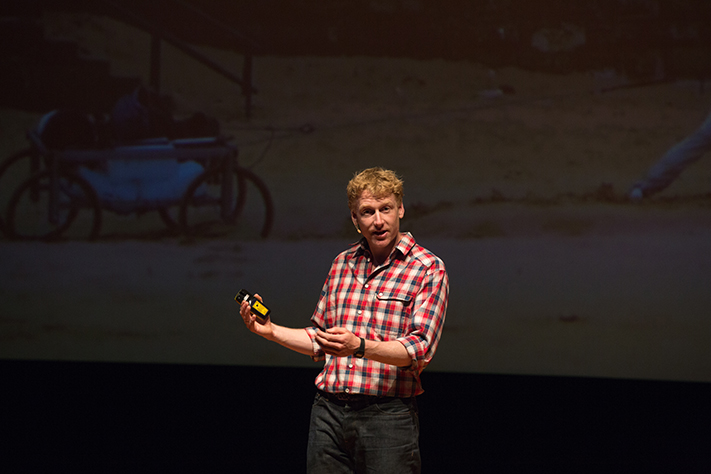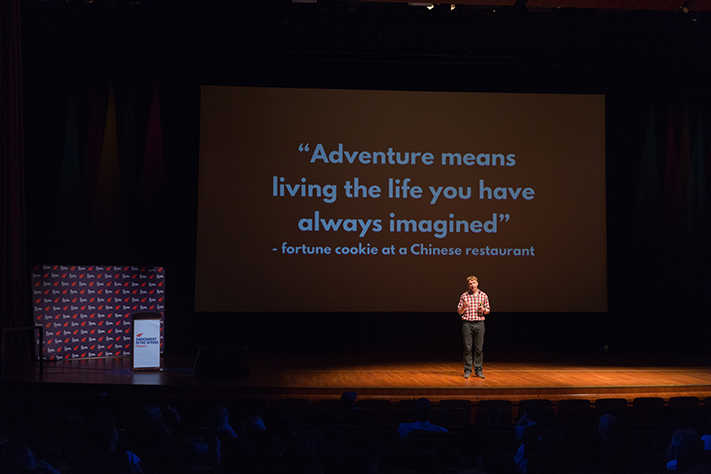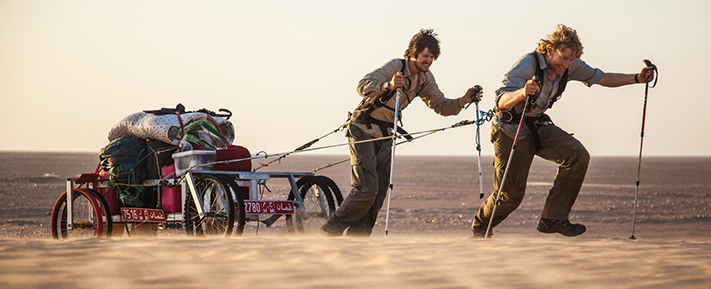Conquering your doorstep mile

British author and explorer, Alastair Humphreys, brought a sense of adventure to the KAUST community during this year's Enrichment in the Spring program.
Explorer and author Alastair Humphreys gave an entertaining and insightful keynote lecture detailing the life and travails of a modern adventurer as part of this year’s Enrichment in the Spring program. The affable British explorer spoke to the KAUST community on April 18, as he detailed his travels, anecdotes, inspirations, fears, aspirations, motivations and goals, as well as sharing advice and encouragement.
Humphreys regaled the audience with tales of his travels, including a four-year bicycle trip from his home in Oxford, U.K.—and back again—via Europe, Africa, the Americas and Siberia in wintertime (a journey of 46,000 miles through 60 countries and five continents). He spoke of his trek across the Empty Quarter with his fellow traveler Leon McCarron, during which they pulled a nearly 300 kilogram cart across 1,000 miles of barren vastness. He also detailed his more recent trips—a transatlantic 3,000 mile, 45-day rowing expedition with a couple of "Slovenian blokes," he said, and a journey of walking across Spain inspired by Laurie Lee’s “As I Walked Out One Midsummer Morning,” with only a violin for his pay and company.
Each travel story was framed with boundless enthusiasm from Humphreys, who drew much laughter and enjoyment from the audience as he detailed his sometimes haphazard adventures with engaging imagery and tales of the characters and situations he encountered.
Humphreys’ 2012 Empty Quarter trek was inspired by the great British explorer Sir Wilfred Thesiger, and in particular Thesiger's trek across the Arabian Peninsula and Empty Quarter that he chronicled in vivid detail in his 1959 book “Arabian Sands.”
“Thesiger’s book is like a love letter to the people of Arabia, and it inspired me to travel through the Empty Quarter. I didn't want to go on a trip where I didn't know anything, but I joined up with people who know everything. I would then become a tourist and I didn't want that,” Humphreys said.
“Deserts are very simple places. They are very simple but not easy," he continued. "I think some of the best adventures are like the desert—simple but not easy. The trip—like any other trip I've taken—is the culmination of many tiny, tiny steps.”
Humphreys also encouraged the audience to not fear or to shy away from extended travel and adventure or from stepping outside their "safety zones."
“Cycling around the world is not what normal people do, but after my trip, I realized I can do something different. I had confidence and momentum and that, for me, is worth more than any money,” Humphreys said.
“I love trying new things and living quickly. Most of my trips have been influenced by my heroes. Heroes are people to aspire to be, but my heroes are just normal people—normal people who took a risk—people who thought boldly. There are so many barriers that stop us from living as adventurously as we could. A lot of these barriers are in our heads—a lot of the time we talk ourselves out of the race before we reach the starting line,” he noted.
“Leave aside the thoughts of death and ask yourself: 'What is the worst thing that could possibly happen on an adventure?' The sensible thing to do is to carry on with a simple life, but unfortunately we can't get eternal happiness from sitting on the couch eating ice cream and watching football,” he said.

Humphreys extolled the audience to start small, reminding them that all great adventures start with small steps. He coined a term—"microadventures"—for these smaller and more manageable trips close to home for people with normal lives. These trips being that they are not prescriptive, leaving scope for people to interpret them however they want to and come up with original ideas of their own.
“Being adventurous means doing things that are new to you. Even with a 9 to 5 job, you can also go on microadventures after work. Don’t let the '9 to 5 grind' become another excuse,” he said.
Throughout the talk, he constantly referred to the phrase "the doorstep mile" as both his travel and lifestyle mantra. The doorstep mile is a Norwegian expression to explain the first few steps of a (long) journey as being the most difficult to undertake.
“If you want something to get done, you have to begin it. Think of your own doorstep mile as the small step you can do to get yourself going. Once you get past your own doorstep mile, what’s stopping you from continuing on?” Humphreys asked.
Humphreys regaled the audience with tales of his travels, including a four-year bicycle trip from his home in Oxford, U.K.—and back again—via Europe, Africa, the Americas and Siberia in wintertime (a journey of 46,000 miles through 60 countries and five continents). He spoke of his trek across the Empty Quarter with his fellow traveler Leon McCarron, during which they pulled a nearly 300 kilogram cart across 1,000 miles of barren vastness. He also detailed his more recent trips—a transatlantic 3,000 mile, 45-day rowing expedition with a couple of "Slovenian blokes," he said, and a journey of walking across Spain inspired by Laurie Lee’s “As I Walked Out One Midsummer Morning,” with only a violin for his pay and company.
Each travel story was framed with boundless enthusiasm from Humphreys, who drew much laughter and enjoyment from the audience as he detailed his sometimes haphazard adventures with engaging imagery and tales of the characters and situations he encountered.
‘People that are a lot smarter than me’
In his opening remarks, Humphreys spoke of his joy at visiting the University, noting, “I'm very excited to have finally made it to the Kingdom and to KAUST. One thing I’ve noticed since I got here is that there are a lot of smart people here—people who are a lot smarter than I am.”Humphreys’ 2012 Empty Quarter trek was inspired by the great British explorer Sir Wilfred Thesiger, and in particular Thesiger's trek across the Arabian Peninsula and Empty Quarter that he chronicled in vivid detail in his 1959 book “Arabian Sands.”
“Thesiger’s book is like a love letter to the people of Arabia, and it inspired me to travel through the Empty Quarter. I didn't want to go on a trip where I didn't know anything, but I joined up with people who know everything. I would then become a tourist and I didn't want that,” Humphreys said.
“Deserts are very simple places. They are very simple but not easy," he continued. "I think some of the best adventures are like the desert—simple but not easy. The trip—like any other trip I've taken—is the culmination of many tiny, tiny steps.”

Humphreys trekked across the Empty Quarter with his fellow traveler Leon McCarron in 2012. Photo courtesy of Alastair Humphreys.
The many barriers to adventure
Humphreys also encouraged the audience to not fear or to shy away from extended travel and adventure or from stepping outside their "safety zones."
Humphreys trekked across the Empty Quarter with his fellow traveler Leon McCarron in 2012. Photo courtesy of Alastair Humphreys.
“Cycling around the world is not what normal people do, but after my trip, I realized I can do something different. I had confidence and momentum and that, for me, is worth more than any money,” Humphreys said.
“I love trying new things and living quickly. Most of my trips have been influenced by my heroes. Heroes are people to aspire to be, but my heroes are just normal people—normal people who took a risk—people who thought boldly. There are so many barriers that stop us from living as adventurously as we could. A lot of these barriers are in our heads—a lot of the time we talk ourselves out of the race before we reach the starting line,” he noted.
“Leave aside the thoughts of death and ask yourself: 'What is the worst thing that could possibly happen on an adventure?' The sensible thing to do is to carry on with a simple life, but unfortunately we can't get eternal happiness from sitting on the couch eating ice cream and watching football,” he said.

British author and explorer, Alastair Humphreys, describing his adventures to the KAUST community during this year's Enrichment in the Spring program. Photo by Lilit Hovhannisyan.
Leave space for a 'microadventure'
Humphreys extolled the audience to start small, reminding them that all great adventures start with small steps. He coined a term—"microadventures"—for these smaller and more manageable trips close to home for people with normal lives. These trips being that they are not prescriptive, leaving scope for people to interpret them however they want to and come up with original ideas of their own.“Being adventurous means doing things that are new to you. Even with a 9 to 5 job, you can also go on microadventures after work. Don’t let the '9 to 5 grind' become another excuse,” he said.
Throughout the talk, he constantly referred to the phrase "the doorstep mile" as both his travel and lifestyle mantra. The doorstep mile is a Norwegian expression to explain the first few steps of a (long) journey as being the most difficult to undertake.
“If you want something to get done, you have to begin it. Think of your own doorstep mile as the small step you can do to get yourself going. Once you get past your own doorstep mile, what’s stopping you from continuing on?” Humphreys asked.
Seize the day
With such an impressive travel C.V. to his name, Humphreys noted that a lot of the people, cultures and traditions he encountered on his trips were completely at odds with how they are portrayed in mainstream media and in conventional thought.“People told me not to go out into the world and visit certain countries, but I ignored them. Traveling to some of the most disadvantaged regions of the world has made me a lot more grateful, and meeting people with few resources made me even more determined not to waste my opportunities. The kindness of random people around the world was one of my fondest memories—a kindness that is at odds with what we see on television,” he said.
“If an expedition doesn't have many challenges, it becomes a gentle holiday," he said. "Adventures are all the better for being unexpected. I want to do a trip that when I'm old I look back on and can be proud of. With everything in life, we have a choice how to see it. We can see everything in life as either a constraint or we can see it as a freedom."
-By David Murphy, KAUST News.

